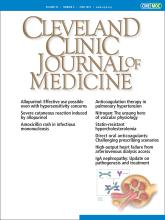Article Figures & Data
Tables
Question Value Response Are the restrictions on normal activities ethically justified? At risk:
Individual liberty (integrity/empathy)
Overriding value:
Public health responsibilities (quality and safety/community)Yes. Restrictions that impinge on individual liberty should be applied equitably when relevant and necessary to protect the public from serious harm. Personal and professional practices must be regularly reviewed and amended for the duration of the pandemic to assure fairness of application. How much more restrictive can the measures ethically be for individuals and communities? At risk:
Justice and autonomy (caregiver/empathy)
Overriding value:
Protection of the public from harm (safety/community)In a public health crisis, healthcare organizations and public health authorities may be required to implement restrictions. Reasoning for the restrictions should be based on those minimally necessary to protect the public/individuals from the harm of infection-transmission. I don't want anyone to know I have COVID-19. Is it a HIPPA violation to report my diagnosis to public health officials? At risk:
Privacy/integrity
Overriding value:
Obligations to our patients' healthNot necessarily. In a public health crisis, the right to privacy typically afforded individuals may be overridden to protect the public from serious harm. Restrictions are the minimum necessary to accomplish public health goal with full transparency to patients. Who has the greatest right to personal protective equipment? At risk:
Protection of all employees and community
Overriding value:
Duty to provide careHealthcare workers have a duty to care for the sick even when this places them at greater risk of harm. To mitigate these elevated risks, healthcare workers should be prioritized when distributing personal protective equipment. How will public health officials and healthcare leaders decide how to distribute the resources if supplies become scarce? At risk:
Providing each patient what they need.(
Overriding values:
Stewardship/utility/transparencyThe distribution of testing and treatment will be equitable and measured by the expectation of benefit. During a pandemic, the parameters for distribution of scarce goods may shift to a focus on rescue of the sick who are expected to recover. What can the public expect regarding updates and communication about how healthcare institutions will make decisions? At risk:
Expending time and resources
Overriding value:
Open and transparentDecisions should be made using an open and transparent process that is accessible to the public. The basis for procedural and allocation decisions will be based on evidence, principles, and shared values. Allocation principle Description example Pros Cons Treating people equally Lottery Military draft, vaccinations, employee drug screening Hard to corrupt; little knowledge about recipients Blind to other factors and ignores relevant principles Waiting list on a first-come, first-served principle ICU beds, organ allocation Favors those with access: wealthy, powerful, and well-connected Protects existing doctor-patient relationships; exposes inequities (lack of insurance, undesirable groups such as prisoners) Favoring the worse off: Prioritarianism Sickest first Emergency room triage, organ allocation Priority to those suffering right now; “rule of rescue”; makes sense in temporary scarcity; proxy for being worst off overall Ignores needs of those who will become sick in future; might falsely assume temporary scarcity; leads to people receiving interventions only after prognosis deteriorates Youngest first ACIP pandemic flu vaccine proposal12 Benefits those who have had least life; prudent planners have an interest in living to old age Undesirable priority of infants over adolescents and young adults (eg, 2-month-old has less life than 20-year-old but is prioritized) Maximizing benefits to all: Utilitarianism Prognosis (highest survival probability and duration) Disaster triage, penicillin distribution Maximizes life years produced Ignores distributive principles; does not consider number of lives saved Number of lives saved Bioterrorism response Avoids need to compare quality of life; less time spent deliberating Ignores other principles Promoting and rewarding social usefulness Behavior Gives priority to those who did not engage in risky behaviors that caused their condition or affected it negatively Promotes healthy lifestyle and individual responsibility Ignores the reason for the individual behavior Instrumental value PPEs to essential healthcare workers during pandemics Serves saving most lives because protects those who can help save others Prone to abuse Reciprocity Rewards irreplaceable people who have served public Justice to people who have contributed in the past Rewards only those who have voluntarily provided societal services in the past; requires time to inquire ICU = intensive care unit; PPE = personal protective equipment
Resource allocation • Recognize that pandemic crisis standards of care can interrupt access to care that is suspended temporarily in outpatient settings. • Use a clinical decision support system in triage decision-making with validated criteria for limits (eg, SOFA scores, Multi-Organ Dysfunction Prediction Score (MODS), age).11,15 • Account for prognosis, comorbidities, and functional status in admission criteria to the ICU. • Form triage teams that are distinct from bedside care team and are specific to allocation decision-making, to reduce moral distress during pandemic settings for the treating team. Ethical responsibility to families • Palliative care for discussions on advanced care planning or decision to withhold or withdraw life-sustaining treatments are done on an individual basis. • Patients appropriately triaged to palliative care are notified of their right to discuss concerns or appeal decisions. In these situations, palliative care and ethics consultation services are readily accessible. Ethical responsibility to healthcare workers • Conservation and reallocation of resources make utilization more efficient and allow appropriate PPE to be made available to healthcare workers across settings such as the hospital, outpatient, long-term acute care facilities, and hospice.






